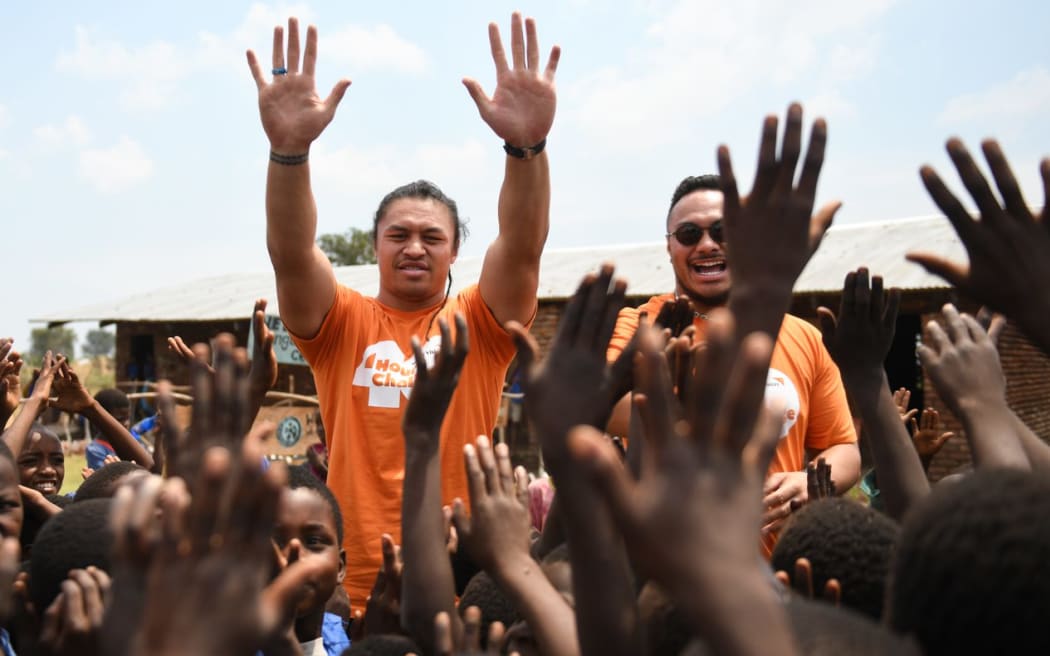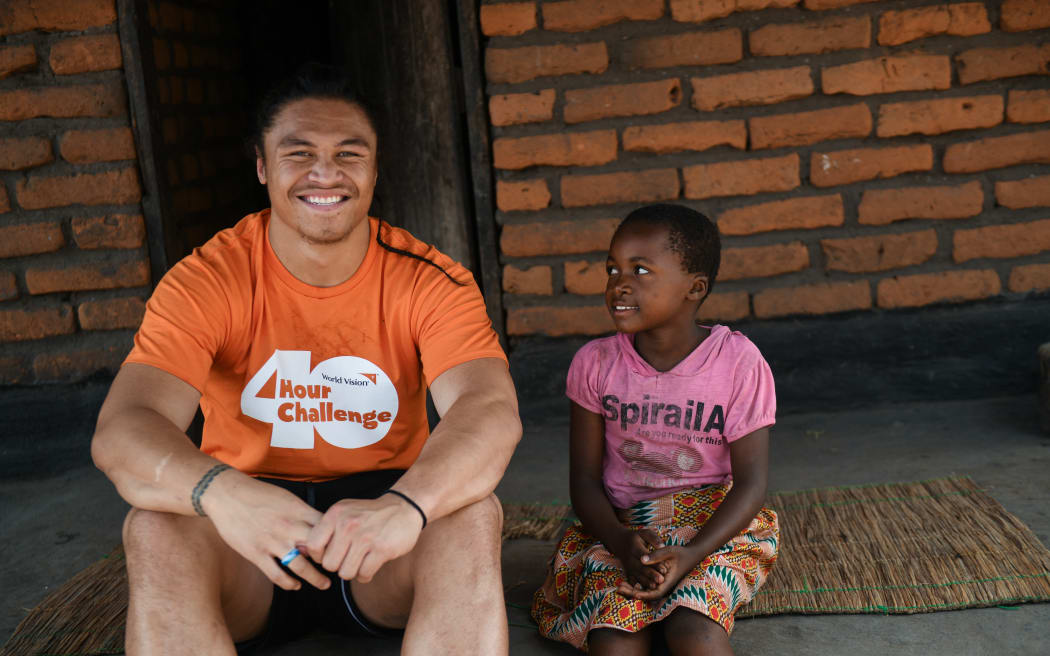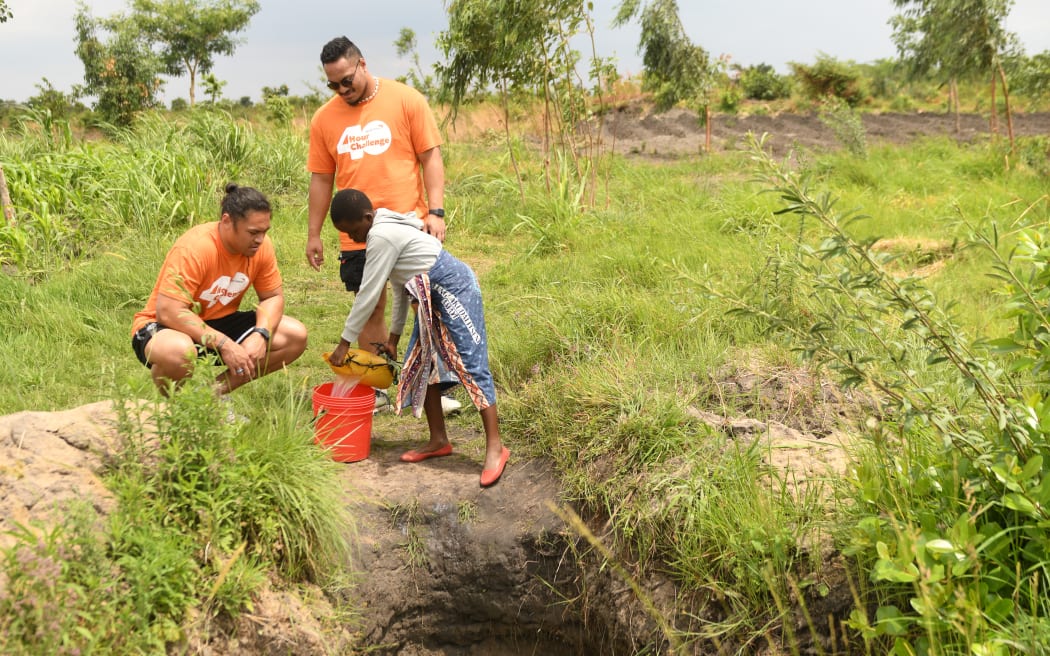
Caleb Clarke’s waves to the crowds in Malawi.
Photo: Supplied
Opinion – It’s a sunny Tuesday and training is done for the Blues. There’s a neat rack of water bottles set up for the 40-odd players sweating it out on Alexandra Park. Caleb Clarke strides over to chat, glances at the readily available water and thinks back to a life-changing trip he took after last year’s All Black tour to Japan and the UK.
The Blues’ home base certainly feels a long way from Malawi in southern Africa, a country where poverty is rife and simply accessing clean water can be a back breaking daily task. Across the continent, unsafe water is one of the biggest killers of children under five. In some places, just getting any is staggeringly hard – 40 billion labour hours a year go to collecting it.
“I’d heard of Malawi, but I never knew much about it. The only thing I really knew was their netball team,” says Clarke. The 15-test All Black, now in his fifth season with the Blues, volunteered to go to Malawi as a World Vision ambassador, helping to promote this year’s 40 Hour Challenge.
“I just thought it was awesome to see how much work was getting done by World Vision. Seeing the need over there, the first thing I noticed was how the kids had to go get water. It was pretty heartbreaking to see what it took just for them to have something to drink.”

Caleb Clarke spends time with Mada.
Photo: Supplied
Clarke was joined by good friend and prominent social media influencer Johnny Tuivasa-Sheck, with the pair admitting that experiencing life in a developing country was “eye-opening”. They were accompanied by World Vision International Partnerships director TJ Grant, who said what struck him about Clarke was that “he has a profound sense of knowing that the talent and platform he possesses is not just for him.”
“He can do some good with it, too. So, to take time on his break from rugby and go to Malawi was really amazing. We wanted to show them the needs, challenges and the work being done to address them.”
“I was so impressed with those guys. When it comes to role models, you have to look for character, and honestly while we had a lot of laughs they really had a heart for connecting with the kids we met. By the end of the trip, you could really tell the experience had tapped into something deep inside of them.”
What struck Clarke was being able to empathise with children and families in Malawi, by experiencing day to day life in the country.
“Getting to live our days like that, it just really puts it in perspective how good we’ve got it here in New Zealand. We can get clean water anywhere, for them it’s so hard to get something that is so necessary just to live.
“We got involved, going into villages and schools to see what they were doing. One of the most memorable moments was going into a school and seeing their WASH club.”
WASH stands for Water, Sanitation and Hygiene, with the clubs teaching children positive behaviours to help keep them safe and healthy.
“The children there were taught about hygiene through different games and songs, and man those kids can sing and dance! Me and Johnny ended up having a dance battle with the kids, stuff like that showed how much joy they have. Over here we’re complaining about all these things in life, but these were the most happy kids you’ll meet. We were always getting welcomed through song and dance, that was the part that stuck out for me the most.”
Grant is confident Clarke’s efforts will help young people understand the scope of work done in developing nation communities by aid organisations, as the perception of altruism has to appeal to a new generation in a post-Covid world.

Caleb Clarke at Prisca’s well.
Photo: Supplied
“It’s about putting yourself in someone else’s shoes, learning about issues that’s outside your shores and doing something tangible to help them. We want people to know they can make a real difference,” Grant says.
“One of our sustainable development goals is that every person, everywhere, deserves access to clean water and sanitation. That’s a human rights issue, a safety issue and a gender issue – women and girls in particular are the ones who have to carry the burden when there isn’t that access, and it puts them in vulnerable situations. In places like Malawi they have to get their water from a river or some sort of open source that’s often not clean. There’s almost 800 million people around the world in that situation, and it leads to sickness and often death.
“So, it’s pretty stark. But the amazing thing is being able to work together and provide water to a community can be done effectively and sustainably… we really empower the community so that’s their water point, they own it, maintain it, and run it. It’s transformative and it changes lives.”
Clarke remembers doing the 40 Hour Challenge as a youngster, then known as the 40 Hour Famine.
“That’s why I got involved. I did the old Just Juice and barley sugars experience, getting a lot out of knowing I was helping a bigger cause. Just being a part of it and making a difference.
“There are so many things to do, in fact we’re doing 40 challenges over the 40 hours. You can get creative, no talking, no sleeping, living out of a bucket – there’s a world of possibilities.”
While 2023 is shaping up to be a huge year for Clarke on the field, the 24-year-old is keen to keep exploring and inspiring off it. Grant says the feeling from World Vision is very mutual.
“It’s such an amazing opportunity to impact a generation of young Kiwis and help them think about the world more broadly. To have guys like Caleb and Johnny resonate and connect in ways that bridge the gap brings the 40 Hour Challenge to life.”
“It wasn’t an easy journey, it involved long road trips and not the nicest places to stay, so for them to come out and say it was one of the best times of their lives, that’s really powerful.”
Stay connected with us on social media platform for instant update click here to join our Twitter, & Facebook
We are now on Telegram. Click here to join our channel (@TechiUpdate) and stay updated with the latest Technology headlines.
For all the latest Sports News Click Here
For the latest news and updates, follow us on Google News.
